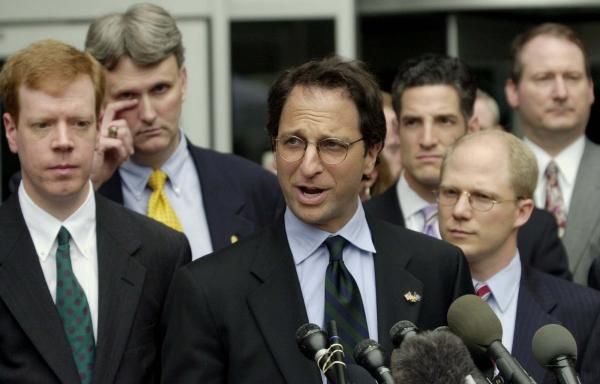 Peter Lattman — whose WSJ Law Blog has quickly become essential daily reading on business law matters — points us to this Corporate Crime Reporter article on former Enron Task Force director Andrew Weissmann, who is leaving the Justice Department for a position in the white collar criminal defense section of Jenner & Block.
Peter Lattman — whose WSJ Law Blog has quickly become essential daily reading on business law matters — points us to this Corporate Crime Reporter article on former Enron Task Force director Andrew Weissmann, who is leaving the Justice Department for a position in the white collar criminal defense section of Jenner & Block.
As this Mary Morrison article explains in detail, Weissmann’s dubious decision to prosecute American accounting icon Arthur Andersen out of business over the firm’s work for Enron was an egregious breach of prosecutorial discretion. In the Corporate Crime Reporter article, Weissman is asked about his decision to prosecute Andersen:
Weissmann defends the prosecution of Andersen against a growing consensus in the defense bar that the firm should not have been prosecuted.
“The company through its choices had given the Department of Justice an ‘all or nothing’ ultimatum,” Weissmann said. “People need to remember that Andersen had been offered a deferred prosecution agreement and rejected it.”
He believes that as a result of the Andersen prosecution, more and more corporations are jumping at deferred and non-prosecution agreements when offered.
“One of the fallouts from Andersen is that corporations are much more willing to say yes to deferred prosecution agreements, because they can see what happened to Andersen,” Weissmann said. “What major corporation is now going to gamble that the Justice Department is going to go away and issue a declination? That’s one of the reasons you are seeing a dramatic rise in deferred prosecution agreements and non-prosecution agreements.”
H’mm, let’s break this reasoning down.
An improper prosecution that cost people and communities in the U.S. over 30,000 jobs was really Andersen’s fault because the firm didn’t agree to a deferred prosecution agreement in regard to crimes that the firm did not commit.
Besides, despite the cost of thousands of jobs and millions of dollars in retirement benefits, the improper prosecution was still justified because it achieved the better good of scaring other companies into selling out their employees and copping deferred prosecution agreements.
That such appalling reasoning goes unchallenged in the article is a daunting sign of our times.
Prosecution of business crimes has become a game of roulette for prosecutors such as Weissmann, who play on an ugly cauldron of public cynicism, resentment, and tolerance for abusive use of governmental power to prosecute the unpopular business executive of the moment.
When the frightening loss of thousands of jobs and the destruction of careers and families is glibly rationalized by a former high governmental official as merely a tolerable cost of the use of the state’s awesome prosecutorial power for the better good of society, we are well on our way to a time when, as Sir Thomas warns us, we will not be able to “stand upright in the winds” of abusive state power that will blow then.
And what about the criminalization of business mindset that Weissmann reflects?
Ayn Rand summed it up well with regard to her observation about socialism (courtesy of Bryan Caplan):
[T]he truth about their souls is worse than the obscene excuse you have allowed them, the excuse that the end justifies the means and that the horrors they practice are means to nobler ends. The truth is that those horrors are their ends.
